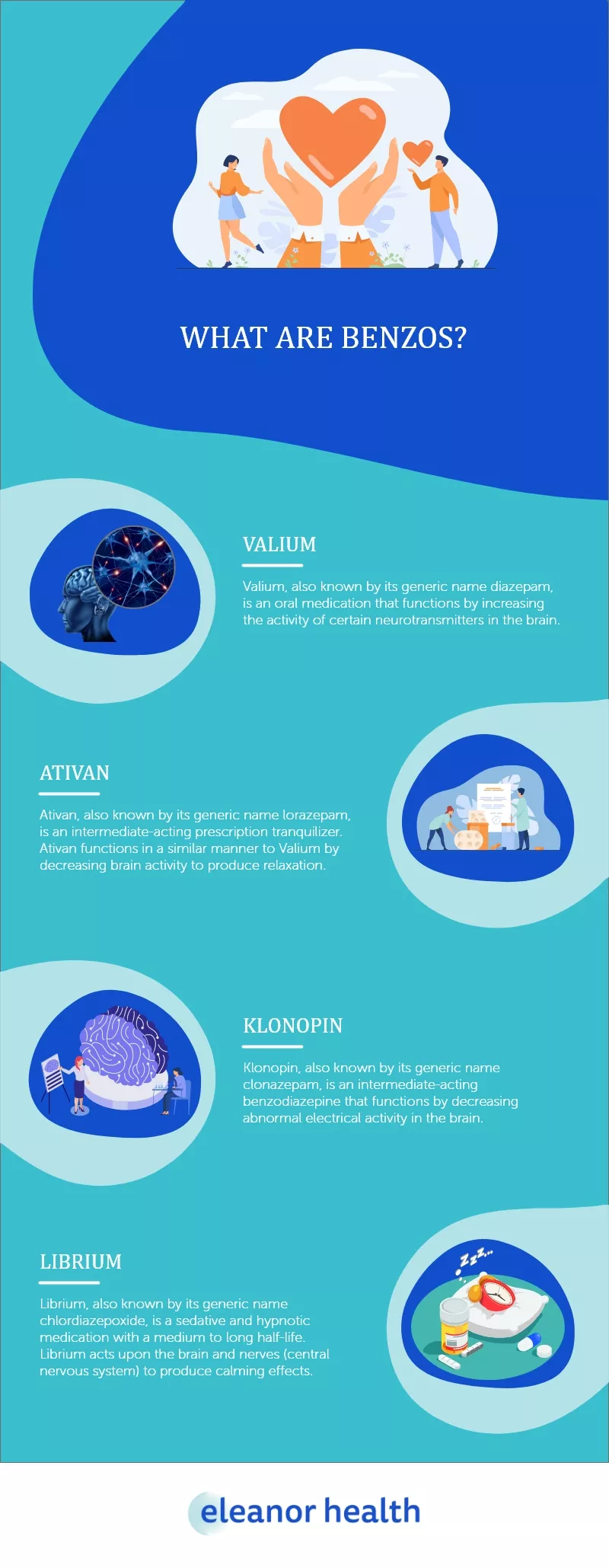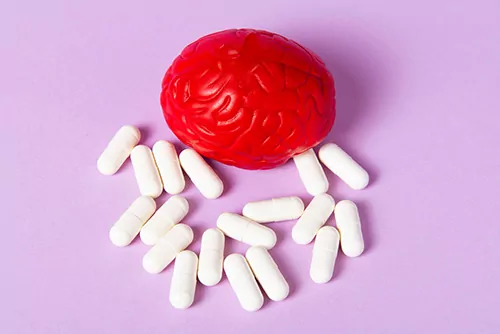Benzos are one of the most globally recognized and widely prescribed medications since the 1970s. According to the National Center for Health Statistics (NCHS), Benzodiazepine is prescribed at about 66 million doctors’ appointments a year in the U.S.
Benzos, also known as minor tranquilizers, are pharmaceutical medications that help slow down brain activity in the central nervous system and the messages traveling between the brain and the body. This is achieved by altering the activity of the neurotransmitter gamma-aminobutyric acid (GABA) that can trigger reactions such as stress and anxiety.
Benzodiazepines are considered safe and effective when used as prescribed. However, it’s only effective as a short-term solution, as long-term use can lead to adverse effects such as tolerance and addiction. The majority of benzodiazepines are sold as pills or tablets for oral use, while some benzos are sold as a clear, odorless injectable liquid.
Benzodiazepines are prescribed as a treatment for a variety of mental disorders and ailments. The U.S. Food and Drug Administration (FDA) has approved the use of benzodiazepines for the treatment of various medical conditions such as:
Benzodiazepines are also prescribed off label to treat health conditions such as:
Although over 2,000 different types of benzodiazepines are produced, only around 15 are currently approved for use by the FDA.
FDA approved benzodiazepines in the United States include:
Each benzo differs in terms of potency, absorbability, and purpose. Benzos can be categorized into two main groups such as hypnotics and anxiolytics. Hypnotic benzos are short-acting medications generally used for the treatment of sleep disorders such as insomnia. Anxiolytics are long-acting benzos generally used for the treatment of anxiety.
Hypnotic benzodiazepines include:
Anxiolytic benzodiazepines include:
Some of the most commonly prescribed benzodiazepines in the U.S. are Valium, Ativan, Klonopin, Librium, and Halcion.
Valium, also known by its generic name diazepam, is an oral medication that functions by increasing the activity of certain neurotransmitters in the brain. Valium is a long-acting benzodiazepine used for the treatment of:
Valium can cause mild to severe side effects in certain people. The most common side effects of Valium include:
Inform your doctor of any persisting side effects or adverse reactions.
Ativan, also known by its generic name lorazepam, is an intermediate-acting prescription tranquilizer. Ativan functions in a similar manner to Valium by decreasing brain activity to produce relaxation. This medication is manufactured and sold in the form of tablets and as liquid solutions for intravenous (IV) injection. Ativan is utilized in the treatment of:
Ativan can cause mild or severe side effects. The more common side effects of Ativan include:
Serious side effects include:
Some of these side effects may dissipate within a few days or a couple of weeks. But if the side effects are persistent or more severe, contact your doctor immediately. If you know someone at immediate risk of self-harm, suicide, or pose a danger to those around them, seek assistance immediately.
Klonopin, also known by its generic name clonazepam, is available as a tablet or as an orally disintegrating tablet (wafer). Klonopin is an intermediate-acting benzodiazepine that functions by decreasing abnormal electrical activity in the brain. Klonopin is used to treat conditions such as:
As with any medications, Klonopin comes with the risk of possible side effects. Some of the most common side effects include:
Klonopin may cause serious side effects, including:
Inform your healthcare provider if these conditions persist and hinder your safety or quality of life.

Librium, also known by its generic name chlordiazepoxide, is a sedative and hypnotic medication with a medium to long half-life. Librium acts upon the brain and nerves (central nervous system) to produce calming effects. It functions by enhancing the effects of a certain natural chemical in the body known as GABA. Librium is used to treat conditions such as:
Librium is usually prescribed for no longer than four months due to its addictive nature. And similar to many benzodiazepines, Librium comes with its own set of side effects.
Common side effects of Librium include:
Librium may cause severe side effects, including:
Inform your doctor if the condition persists or worsens so your dosage can be altered or an alternative medication can be prescribed.
Triazolam, sold under the brand name Halcion is a central nervous system depressant tranquilizer of the triazolo-benzodiazepine class of drugs, which are derivatives of benzodiazepines. Halcion acts on the brain to produce a calming effect and is used as a short-term treatment for certain sleep problems such as insomnia. Halcion is generally prescribed for a period of one to two weeks or less.
Halcion helps you fall asleep faster, stay asleep longer, and lessen how often you wake up during the night to improve the quality of your sleep. The most common side effects of Halcion include:
While these symptoms generally dissipate within a few days, some may experience more severe side effects such as:
If you experience any of these severe symptoms, contact your doctor immediately and address these issues.
Benzodiazepines can interact with certain medications negatively, so doctors must be kept informed of all the medications you consume. This also includes supplements and herbal medications. Medication that can react with benzodiazepines includes:
The FDA has reported that benzodiazepines, when used in combination with opioid medications or other sedating medications, can result in serious adverse reactions, including slowed or difficult breathing and death. Seek immediate medical attention if you experience unusual dizziness or lightheadedness, extreme sleepiness, slow or difficult breathing, or unresponsiveness.
Just as it’s important to notify your doctor of other medications you may be taking, it’s also important to discuss your medical history and current conditions before being prescribed benzos. Benzodiazepines must be avoided by individuals who are diagnosed with:
Benzos aren’t suitable for children, except in rare cases of acute anxiety or insomnia caused by fear or sleepwalking.
Benzodiazepines should also be avoided if possible during pregnancy. As it increases the risk of physical complications in the developing baby, such as:
If benzos are consumed during the last term of pregnancy, it can cause complications in newborn babies, including:
Breastfeeding should also be avoided while taking benzodiazepines as traces of the medication are present in breast milk and may gradually build up in the baby’s body and cause side effects.
Most benzodiazepines are often used for short periods of time due to their ability to cause tolerance, dependence, and addiction over long-term use.
If you are seeking help with your loved one’s addiction, contact us today or complete our quick contact form below, to speak with an addiction treatment specialist.
If you need help with your substance use disorder, we are here to help you build your confidence and momentum towards the future you want. We provide treatment services for adults with alcohol, opioid, and other substance use disorders. We are currently located in Louisiana, Massachusetts, New Jersey, North Carolina, Ohio, Texas, and Washington.
 Identifying and Treating Symptoms of Benzodiazepine Withdrawal
Identifying and Treating Symptoms of Benzodiazepine Withdrawal
 Medications for Anxiety and Depression: An Essential Medication Guide
Medications for Anxiety and Depression: An Essential Medication Guide
 What are SSRIs?
What are SSRIs?